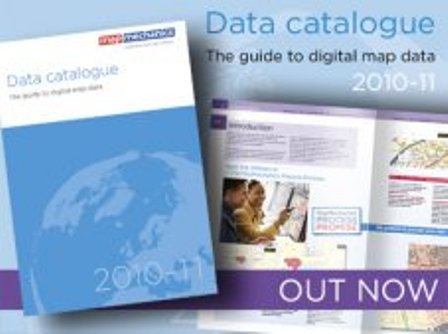
More digital mapping and related data, much reduced pricing, invaluable beginners' background information, and fascinating insights into how data is processed and structured to make it faster, easier and more powerful to use - all this is combined in the 2010 edition of MapMechanics' ever-popular Data Catalogue, which is published this week.
The Data Catalogue is much more than an extensive and detailed listing of map data products from MapMechanics, though it is now a definitive example of its kind. Beyond that, this extensively illustrated publication has become a landmark in the world of digital mapping and geographic information systems, providing a sweeping perspective on the kinds of mapping and related geodemographic and business data available for the UK and the world.
The Data Catalogue is now thought to be the only printed publication of its kind to cover the market in anything like this breadth and depth. The full-colour, 92-page A4 printed 2010 edition is complemented by a comprehensive online version, which can be consulted freely at http://www.mapmechanics.com.
Fully updated for this new edition, the introductory section provides an unrivalled explanation of the key concepts of digital mapping. For instance, it highlights the distinction between vector scaleable map data and background raster data, and explains postcode geography, census geography and the meaning of geodemographics (the links between geography and information about the population).
The introduction also details MapMechanics' recently-introduced Process Promise, a scheme to assure users that the company will take the raw data from its originators and supply it ready-formatted for business use, saving them the time, complexity and cost of preparing it in-house. Throughout the Data Catalogue, special Process Promise information panels provide interesting details about how the data is processed.
Savings in the prices of digital map data are in evidence throughout the product directory, and reflect a recent downward trend in the price of both mapping and related data in the UK. The actual savings vary widely, but striking examples include a reduction of more than 50 per cent on some UK mapping and boundary data sets and gazetteers; of 20 per cent on North American profiling data; and of more than £4,000 on some international street mapping data.
This year's edition of the catalogue also lists many products for the first time, including for instance the MB Consumer Spending and MB Retail Spending data sets - ideal for businesses wanting to target their sales and marketing efforts with greater precision. The consumer data shows the proportion of UK spending on a wide range of goods and services, while the retail spending data shows the available for retail spending by area, related to the national average.
On the mapping front, there are new products for almost every part of the world, including areas where high-resolution mapping has previously been harder to come by. Examples include steet-level mapping for Ivory Coast, Botswana and Slovenia; geocoding data for Latvia, and address data for Guatemala.
There is also more geodemographic data, including for instance socio-demogrpahic data packs for Algeria, purchasing power for the Cayman Islands and socio-demographic data for Sveitarfélög in Iceland.
In another new development, the Data Catalogue helps users to take fuller advantage of recent GIS functionality that makes it possible to combine locally-stored information with background mapping and aerial photography held on the web. For the first time, business-use licences for access to the Microsoft's Bing Mapping are included, providing the user with the ability to use aerial photography and mapping overlays within GeoConcept, the powerful geographic information system.
The catalogue also brings out the increasing range of traffic speed data that can be linked to road maps, helping users to produce more accurate real-world journey plans and travel time analysis.
In all, the Data Catalogue provides specifications and prices of hundreds of digital mapping products (gazetteers, boundaries, roads, streets, satellite imagery, expenditure, population, business and postcode data sets for UK and the world). It includes details of updates, multi-user rates and internet licensing.
About MapMechanics
MapMechanics has been providing innovative solutions in logistics planning, sales and marketing, digital mapping and geographic analysis for over twenty years. MapMechanics uses digital map-based technologies to offer an extensive range of Web, desktop, paper and component solutions for a variety of business applications, from atlas production to business analysis, site selection, customer profiling and vehicle routing and scheduling.
MapMechanics distributes a wide range of data products including AA, NAVTEQ and Ordnance Survey digital mapping, as well as leading business and demographic datasets from many sources throughout the world. This data is listed in the Data Catalogue, which is probably the most extensive and up-to-date printed listing of its kind in Britain. It is published at least once a year, and is also available on the Internet.
MapMechanics is a major supplier of software solutions. It is the UK distributor of the GeoConcept geographic information system, which is used extensively in a diverse range of fields such as retail planning, marketing, healthcare, environmental planning and management, transport and logistics, site selection, network planning and territory allocation, telematics and command and control applications, policing and broadcasting, and central and local government.
MapMechanics also supplies and supports MicroAnalytics' TruckStops UK and OptiSite UK. TruckStops is one of the world's best-established scheduling solution, and OptiSite is a widely-deployed network modelling tool. Backing up its extensive product range, MapMechanics offers a comprehensive service of implementation support and training.